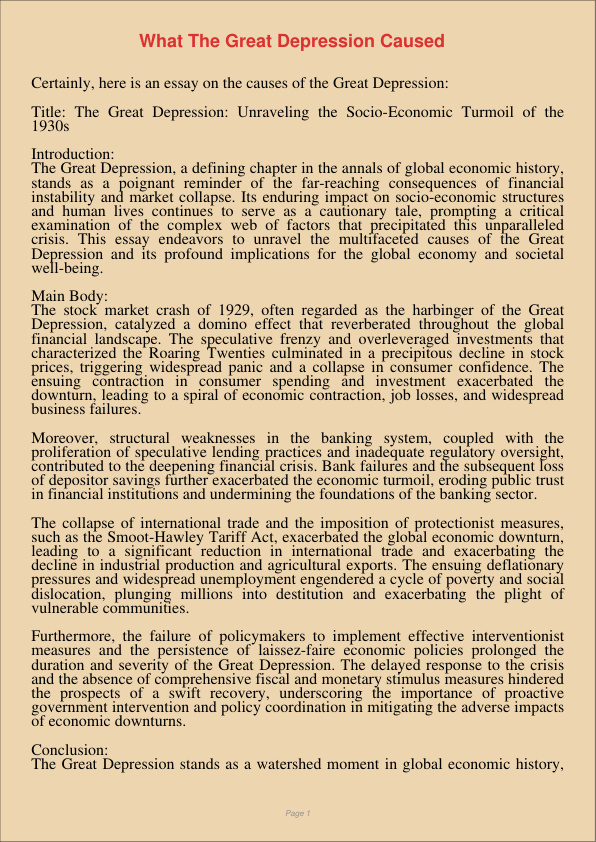
Certainly, here is an essay on the causes of the Great Depression:
Title: The Great Depression: Unraveling the Socio-Economic Turmoil of the 1930s
Introduction: The Great Depression, a defining chapter in the annals of global economic history, stands as a poignant reminder of the far-reaching consequences of financial instability and market collapse. Its enduring impact on socio-economic structures and human lives continues to serve as a cautionary tale, prompting a critical examination of the complex web of factors that precipitated this unparalleled crisis. This essay endeavors to unravel the multifaceted causes of the Great Depression and its profound implications for the global economy and societal well-being.
Main Body: The stock market crash of 1929, often regarded as the harbinger of the Great Depression, catalyzed a domino effect that reverberated throughout the global financial landscape. The speculative frenzy and overleveraged investments that characterized the Roaring Twenties culminated in a precipitous decline in stock prices, triggering widespread panic and a collapse in consumer confidence. The ensuing contraction in consumer spending and investment exacerbated the downturn, leading to a spiral of economic contraction, job losses, and widespread business failures.
Moreover, structural weaknesses in the banking system, coupled with the proliferation of speculative lending practices and inadequate regulatory oversight, contributed to the deepening financial crisis. Bank failures and the subsequent loss of depositor savings further exacerbated the economic turmoil, eroding public trust in financial institutions and undermining the foundations of the banking sector.
The collapse of international trade and the imposition of protectionist measures, such as the Smoot-Hawley Tariff Act, exacerbated the global economic downturn, leading to a significant reduction in international trade and exacerbating the decline in industrial production and agricultural exports. The ensuing deflationary pressures and widespread unemployment engendered a cycle of poverty and social dislocation, plunging millions into destitution and exacerbating the plight of vulnerable communities.
Furthermore, the failure of policymakers to implement effective interventionist measures and the persistence of laissez-faire economic policies prolonged the duration and severity of the Great Depression. The delayed response to the crisis and the absence of comprehensive fiscal and monetary stimulus measures hindered the prospects of a swift recovery, underscoring the importance of proactive government intervention and policy coordination in mitigating the adverse impacts of economic downturns.
Conclusion: The Great Depression stands as a watershed moment in global economic history, underscoring the significance of prudent financial regulation, proactive government intervention, and international cooperation in averting and mitigating the impact of economic crises. By drawing lessons from the root causes and ramifications of the Great Depression, policymakers and societies can strive towards building more resilient and inclusive economic systems that prioritize stability, sustainability, and equitable growth for all.
「真诚赞赏,手留余香」
真诚赞赏,手留余香
使用微信扫描二维码完成支付
